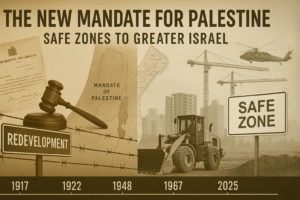Geopolitical Briefing: Iraq
— 5 August 2025
- Baghdad submitted an updated formal complaint to the UN Security Council regarding recent Israeli violations of Iraqi airspace.
- Iraqi Prime Minister emphasized preventing Iranian-aligned paramilitary interventions, blocking multiple attempted drone and missile attacks.
- Iraq and UK move toward finalizing a returns agreement to curb migrant smuggling via Iraqi Kurdish channels.
- Iraq advances participation in the Development Road transit corridor, implementing TIR system and rail‑modernization with World Bank support.
On 13 June 2025, Iraq formally lodged a complaint with the UN Security Council, condemning the passage of approximately 50 Israeli warplanes through Iraqi airspace prior to strikes on Iran. The submission reiterated demands that the UNSC uphold Iraq’s sovereign territorial integrity and enforce non‑interference principles under international law (YouTube, Iraqi Ministry of Foreign Affairs, AP News, The Sun, Wikipedia). Iraq’s escalation at the UN reflects a determined posture to assert control over its borders and deny unauthorized incursions by external actors, thereby reinforcing claims to sovereign airspace control.
Over the past week, Prime Minister al‑Sudani announced that Iraqi security forces successfully intercepted 29 attempted drone and missile strikes by Iran‑aligned militias operating within Iraq. According to al‑Sudani, these operations prevented escalation amid the ongoing Israel–Iran war and reaffirm Baghdad’s control over use of force within its territory (AP News). This underscores a calibrated strategy to neutralize proxy escalation while preserving Iraq’s internal stability and limiting foreign influence within its security domain.
In ongoing diplomacy, the UK and Iraq are nearing finalisation of a returns agreement targeting notably Kurdish smuggling networks facilitating migrant flows to Britain. Negotiations aim to enable repatriation of Iraqi nationals intercepted at sea, placing pressure on Iraqi regional authorities to clamp down on illicit migration channels (AP News, The Sun). This prospective treaty aligns with Baghdad’s intent to manage cross‑border population movements and assert governance over regional Kurdish conduits.
Iraq has implemented full operational status of the TIR transit system and secured $930 million in World Bank funding for its rail infrastructure modernization project connecting Umm Qasr Port to Mosul. The TIR route has already enabled an international logistics corridor facilitating 10‑day multimodal freight travel from Europe to the Gulf via Iraq—a 58 % reduction in transit time (Wikipedia). This reflects Baghdad’s strategic emphasis on asserting economic sovereignty through control of transport infrastructure while deepening trade-based connections within the Islamic region and beyond.


